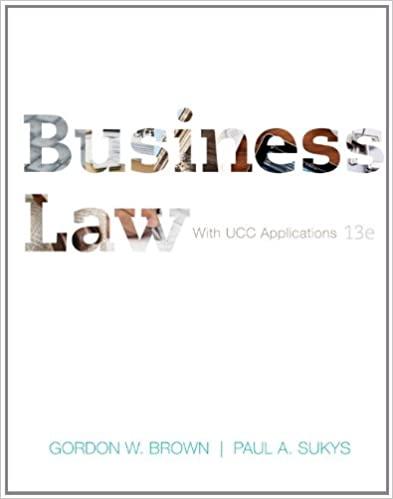Kathy Tonkin and her six children were members of an organization known as the Life Tabernacle Church
Question:
Kathy Tonkin and her six children were members of an organization known as the Life Tabernacle Church (Tabernacle). After 12 months within the Tabernacle, Tonkin left the church because she was convinced that it was a harmful cult. When she left the Tabernacle, she took her three youngest children with her, but the three oldest children, Scott, Thysen , and Matthew, decided not to leave. Tonkin called the Seattle Community Service hotline, which referred her to Shirley Landa , a high-profile anti-cult activist associated with a group called the Cult Awareness Network (CAN).
Landa was one of the organizers of a group called the Citizens Freedom Foundation, the forerunner of CAN.
She was also on CAN’s list of contacts in Washington, received about five referrals from CAN every year, and formerly had been a member of the CAN board. The Cult Awareness Network relies primarily on contact people like Landa to act as their field agents; CAN expressly asks contact people to say that they are “assisting on behalf of CAN.” In this case, after being contacted by Tonkin and reviewing the case, Landa recommended that Tonkin contact Rick Ross, a professional deprogrammer who frequently worked on behalf of CAN. Ross successfully deprogrammed Thysen and Matthew, the two younger Tonkin children, but did not succeed in deprogramming Scott. Ross, along with two of his associates, Mark Workman and Charles Simpson, took custody of Scott and detained him for five days, in an effort to deprogram him. After pretending to be won over, Scott got away from his captors and eventually brought this lawsuit against Ross and CAN. Attorneys for CAN argued that the case against the network should be dismissed because Ross was not its agent. In turn, Scott argued that Ross was referred by Landa , who was an agent of CAN, and that she had both express and implied authority to make such referrals. Scott pointed out that CAN had many such contact agents, that it operated mostly through those contact agents, that those contact agents had the express authority to say that they assisted CAN, that CAN itself had a long history of using deprogrammers like Ross, and that CAN knew about the activities of Ross. Therefore, Scott concluded, Ross was working as an agent of CAN. Both the trial court and the appellate court agreed. (See Scott v. Ross, Workman, Simpson, and the Cult Awareness Network, Case No. 96-35050, U.S. Court of Appeals for the Ninth Circuit.)
Question
1. What is express and what is implied authority?
2. Does it make any difference to Scott’s argument that Landon is a gratuitous agent? Explain.
3. Could Scott have argued that Landon’s authority was apparent rather than express or
implied? Explain.
4. If the case had been based on apparent authority, would the outcome have changed? Explain.
5. Why did CAN choose to disavow its relationship with Ross and Landon? Explain.
Step by Step Answer:

Business Law With UCC Applications
ISBN: 9780073524955
13th Edition
Authors: Gordon Brown, Paul Sukys





